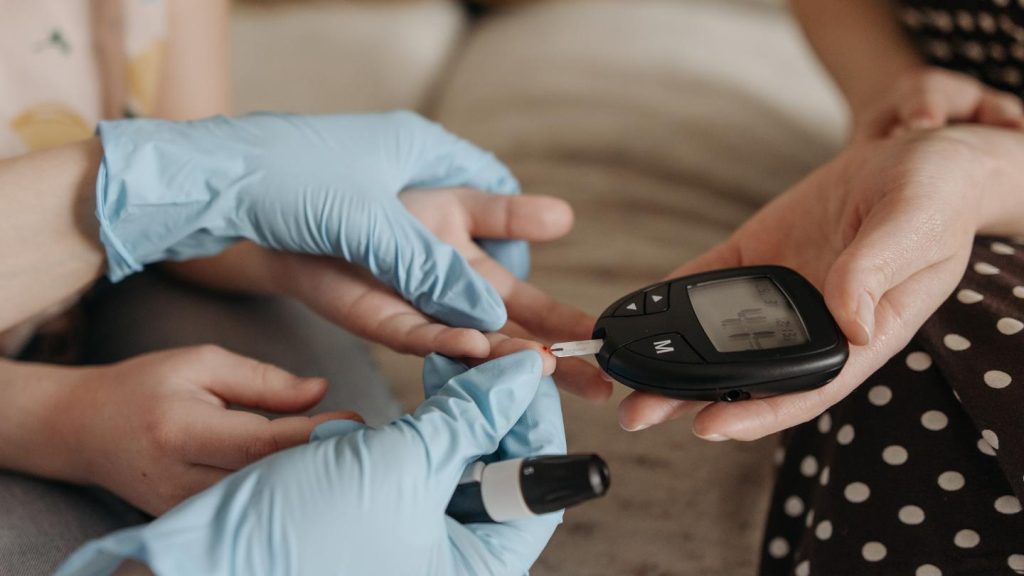
How Does Obesity Lead to Diabetes? Understanding the Connection
How does being overweight cause diabetes? Obesity leads to diabetes by causing insulin resistance, inflammation, and fat metabolism issues. This blog will break down these connections and explain how obesity leads to diabetes and how managing obesity can help prevent diabetes.
Key Takeaways
- Over 90% of type 2 diabetes cases involve overweight or obesity, highlighting the link between obesity and insulin resistance, especially due to subcutaneous abdominal fat.
- Mechanisms such as insulin resistance, inflammatory responses, and disrupted fat metabolism play critical roles in how obesity increases the risk of developing type 2 diabetes.
- Preventive strategies against obesity-related diabetes include weight loss through a healthy diet and exercise, which significantly lower diabetes risk and improve overall health.
The Link Between Obesity and Type 2 Diabetes

The indisputable link between obesity and type 2 diabetes is highlighted by the fact that over 90% of people with type 2 diabetes are either overweight or obese. This connection is emphasized through body metrics like waist circumference and Body Mass Index (BMI), which serve as standard gauges for assessing obesity.
Obesity, defined by a BMI of 30 or above, often leads to an elevated risk of developing type 2 diabetes. Yet, it’s not solely the total amount on the scale that counts. Rather, where body fat accumulates is also critical in determining risk levels. Subcutaneous abdominal adipose tissue notably poses a greater threat for instigating type 2 diabetes compared to overall body weight due to its role in metabolic activity and its contribution towards insulin resistance along with other related disruptions.
Comprehension of these links underscores why management of both body weight and composition are key strategies in curtailing the onset risk associated with this chronic disease. By confronting issues tied to excess adiposity, preventative measures can be implemented against this debilitating condition’s development.
Read more: Understanding Obesity Side Effects: A Guide to Health Risks
Mechanisms Behind Obesity-Induced Diabetes
Several intertwined processes, including insulin resistance, inflammation, and fat metabolism abnormalities, are at the heart of the connection between obesity and type 2 diabetes. This confluence elevates an individual’s chances of contracting type 2 diabetes substantially.
The accumulation of excess body fat within adipose tissue can lead to a condition known as adipose tissue insulin resistance. This phenomenon hampers the ability to efficiently utilize one’s own insulin hormone. Immune cells in adipose tissue discharge inflammatory substances that exacerbate insulin resistance and elevate blood glucose levels. Obesity also interrupts typical lipid metabolism pathways. This interference affects not only skeletal muscle glucose usage but also shifts gene expression within adipose tissues alongside subcutaneous fat markers—alterations that foster impaired fasting glucose.
Gaining insight into these specific cellular and physiological mechanisms offers a more defined understanding of obesity’s role in precipitating type 2 diabetes development. Targeting these fundamental issues is pivotal for enhancing strategies aimed at prevention and treatment efficacy.
Read more: Improving Heart Health: Addressing Heart Disease and Obesity
Insulin Resistance
The accumulation of excess body fat is a primary factor in the development of insulin resistance, which is closely associated with the onset of type 2 diabetes. This condition manifests when cells become desensitized to insulin, impairing their ability to regulate blood sugar adequately. Typically, this insensitivity stems from the obstructive presence of additional body fat hindering glucose absorption by cells.
Fatty acids released into circulation from excessive body fat disrupt normal glucose uptake within muscle cells and contribute significantly to escalating levels of insulin resistance. To counteract rising blood sugar levels under these conditions, the pancreas must produce increasing amounts of insulin. As resistance progresses and becomes more pronounced over time, even heightened quantities are not effectively actioned upon by bodily tissues. Consequently, an individual may experience persistently elevated high blood sugar levels—a defining characteristic indicative of type 2 diabetes.
Understanding how instrumental managing one’s body weight and boosting insulin sensitivity are in warding off or controlling type 2 diabetes serves to underscore proactive interventions targeting both areas for those at risk or already diagnosed with this metabolic disorder.
Inflammatory Response
Chronic inflammation is a pivotal factor in the onset of type 2 diabetes. When obesity sets in, it activates immune cells within the adipose tissue, which secrete pro-inflammatory cytokines. These substances disrupt insulin signaling processes, thereby exacerbating insulin resistance.
Obesity-related persistent minor inflammation not only impairs insulin sensitivity but also detrimentally affects general metabolic well-being. By diminishing inflammation within adipose tissue, there may be an enhancement in insulin sensitivity and a consequent decrease in the risk of developing type 2 diabetes.
Disruption of Fat Metabolism
Excess weight can hinder the proper metabolism of fats, which is crucial in preventing type 2 diabetes. As obesity prompts fat cells to release fatty acids into the blood, it disrupts how skeletal muscles normally metabolize glucose. This disruption may result in prediabetes, where individuals exhibit elevated blood sugar levels that are not quite high enough for a full-blown diabetes diagnosis.
Prediabetes elevates an individual’s risk of developing type 2 diabetes if no interventions occur. By enhancing fat metabolism and combating obesity, steps can be taken proactively to halt the progression towards type 2 diabetes.
Read more: Causes of Obesity That May Surprise You
Risk Factors for Developing Type 2 Diabetes

Numerous factors elevate the risk of type 2 diabetes onset, prominently including obesity. Lack of physical activity combined with excessive calorie consumption contributes to a rise in insulin resistance and elevated blood sugar levels. Advancing age heightens diabetes susceptibility, notably past the age of 45.
Certain ethnic groups have an increased propensity for developing type 2 diabetes. This includes African Americans and Hispanics. Existing chronic conditions like high blood pressure can intensify the likelihood of development. A genetic predisposition is also a significant determinant that may render some individuals more prone to diabetes.
Recognizing these various risk factors is instrumental in pinpointing individuals who face a heightened threat and devising proactive measures to thwart the progression toward type 2 diabetes.
Read more: How Obesity Affects Your Risk of Cancer
Diagnosing Type 2 Diabetes in People with Obesity
The diagnosis of type 2 diabetes in individuals with obesity is often a complex task, as it involves the intricate relationship between insulin resistance and body-wide inflammation. A variety of diagnostic procedures are available to identify diabetes. One such procedure includes measuring the blood sugar after an oral glucose tolerance test. If this test yields a level at or exceeding 200 mg/dL two hours post-consumption, it may be indicative of diabetes.
There’s the random blood sugar test, which also plays a significant role in detection. If someone exhibits symptoms typical for diabetes, having a reading above 200 mg/dL on this particular assessment confirms its presence. The A1C examination averages out your blood sugar concentrations over several months (usually two to three), flagging levels beyond 6.5% as diabetic markers. Consistently observing fasting blood glucose equaling or topping off at 126 mg/dL can Signal the likely existence of said disease—a vital factor for early diagnosis.
For those battling obesity — a group already facing elevated risks — it becomes even more essential to undergo regular check-ups and screening practices aimed at catching and tackling diabetes sooner rather than later. Recognizing how these tests work paves the way for swift identification followed by efficient management measures geared towards enhancing overall health status.
Read more: Hypertension & Obesity Management with Weight-Loss
Prevention Strategies for Obesity-Related Diabetes

To thwart the onset of obesity-related diabetes, a comprehensive strategy encompassing weight loss, dietary management, and consistent physical activity is essential. Implementing these measures not only diminishes the likelihood of succumbing to type 2 diabetes but also enhances general health.
Combatting poor dietary patterns, ramping up exercise levels, and securing a healthy weight stand as pivotal elements in evading the development of this condition. Proactive efforts markedly slash the risk associated with developing diabetes along with various other health complications.
Weight Loss
Shedding pounds can significantly diminish the chance of developing type 2 diabetes. Research indicates that a modest reduction in body weight, specifically by as little as 5%, could slash the risk considerably—by more than half. For individuals grappling with obesity, aiming to decrease their total body weight by between 3% and 5% can result in notable enhancements to their health.
The best way to lose weight is through close monitoring, dietary consultation services, tailored exercise plans, and assistance with altering lifestyle behaviors. Such a holistic strategy supports participants not only in achieving enduring weight loss but also in enhancing their overall well-being.
Diet and Nutrition
Maintaining a balanced diet plays a pivotal role in warding off diabetes linked to obesity. Opting for whole foods and reducing the intake of unhealthy fats and sugars is key to controlling body weight efficiently. A diet abundant in fruits, vegetables, whole grains, and lean proteins can bolster insulin sensitivity and enhance metabolic wellness overall.
Steering clear of foods laden with excess sugar and fat is imperative to avoid unnecessary weight gain and combat insulin resistance. Choosing nutritious options diminishes the risk of developing type 2 diabetes while promoting sustained health benefits.
Exercise
Regular exercise is vital for maintaining healthy blood sugar levels and overall metabolic health. Adults should aim for at least 150 minutes of moderate physical activity each week to effectively reduce the risk of diabetes. Structured exercises like aerobics and resistance training are particularly beneficial for managing weight and improving skeletal muscle insulin sensitivity.
Cost of Obesity and Diabetes
Healthcare systems are under a considerable and escalating economic strain due to obesity and diabetes. The resource depletion caused by these diseases is noteworthy, with their associated expenses projected to escalate further. Healthcare providers like the NHS encounter untenable fiscal stresses as a result of the widespread occurrence of obesity and diabetes.
To mitigate expenditures linked to obesity and diabetes, it’s imperative that culturally relevant educational materials be disseminated alongside effective preventive measures. Allocating resources towards prevention and control initiatives can diminish economic burdens while enhancing overall public health results.
Conclusion
The complex interplay between obesity and type 2 diabetes is clear, involving numerous factors. Understanding these mechanisms and risk factors empowers us to prevent and manage both conditions proactively.
At Wellstar Comprehensive Bariatric Services, we are dedicated to supporting your journey toward better health. Explore our bariatric services in Cobb County and across Georgia, including Marietta, Austell, Smyrna, and LaGrange, and discover how we can help you achieve a healthier lifestyle. Want to take charge of your health and future? Reach out to us today to start your transformative journey!
